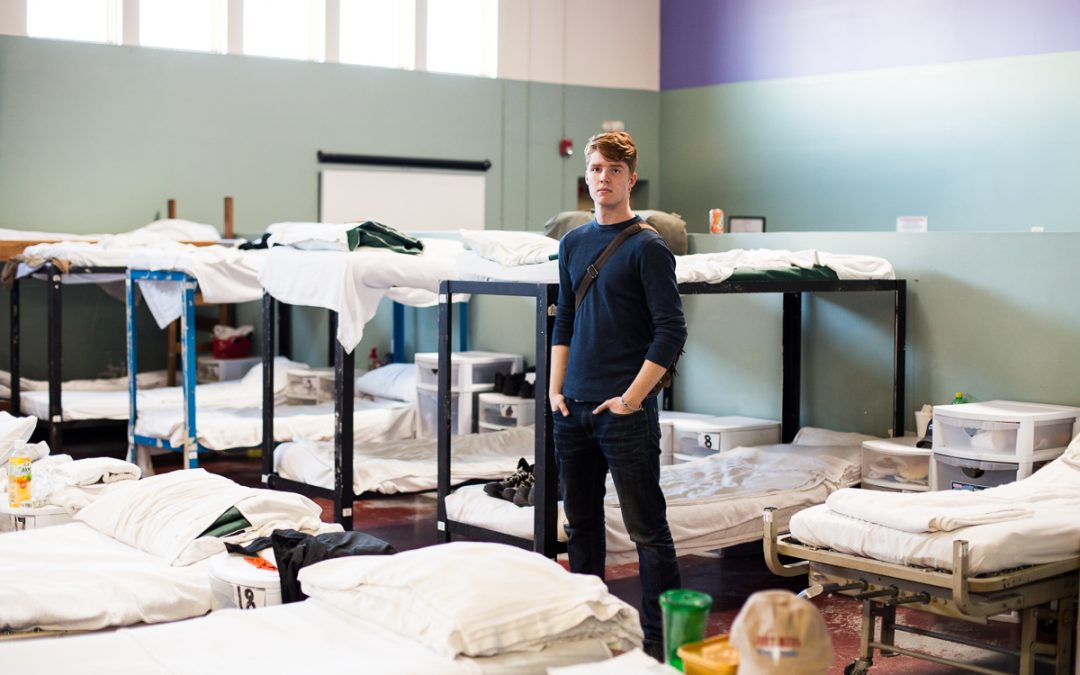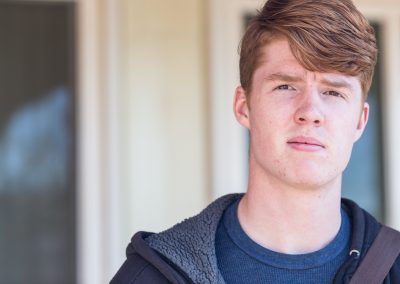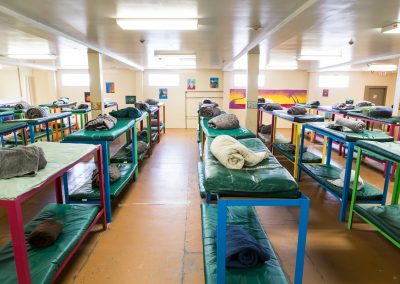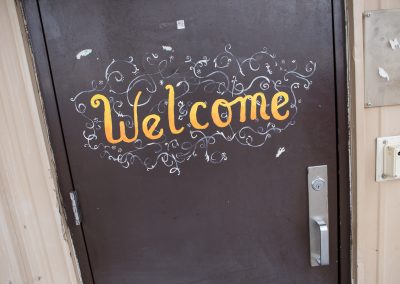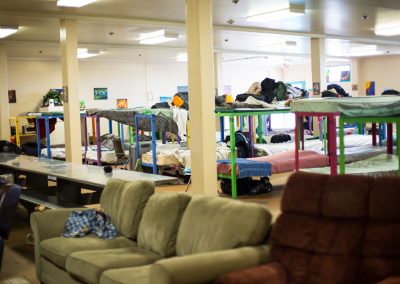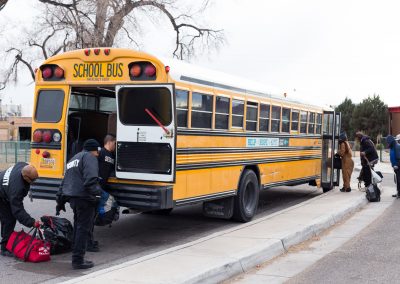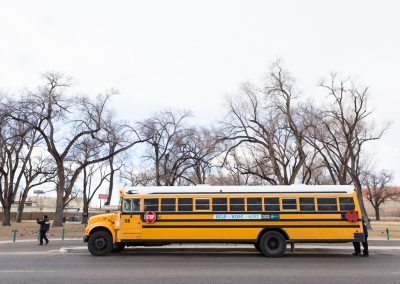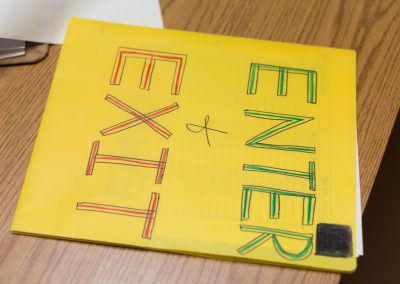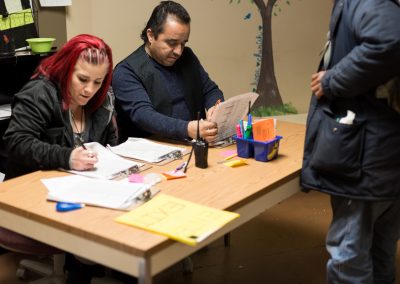Introduction
Heading Home welcomed Sam Mahoney for a two month full-time internship this spring. Sam is from Bourbonnais, IL, a small community outside of Chicago, and is in the middle of an adventure-filled gap year between high school and college. Sam participated in almost every aspect of Heading Home’s programs and services. He assisted with moving furniture on our Friday move-ins for newly housed clients, attended events with our housed neighbors and performed research for our Development & Communications teams.
In addition, Sam had the opportunity to go ‘under cover’ to both of the shelters run by Heading Home, the ABQ Winter Shelter and the AOC men’s emergency shelter. With the mentorship of our CEO, Dennis Plummer, who has also done these visits in the past to make sure our organizational values are consistently acted out through service provision, Sam went through exactly the same experience our shelter residents go through daily. He went to each pick-up location, rode to the shelter with residents, went through the intake process, and stayed overnight at each shelter. We sat down for an interview with Sam to talk about this particularly powerful aspect of his internship experience.
How did you get involved with Heading Home, and why did you decide to intern here?
I am traveling for a gap year between high school and college right now. Heading Home’s CEO Dennis Plummer is a family friend, and he invited me to come to Albuquerque for the internship.
I wanted to intern with Heading Home because I was on board with the cause. In addition to working with an organization whose mission I was interested in, I was also interested in the mentorship opportunity. The theme of my past few months has been adventure: getting out and exploring the world, traveling, hiking, and camping. Dennis has been personally inspiring to me, he is very adventurous and I was excited to connect with him as a mentor.
What was the idea behind sleeping over at the shelters? Who and where did it come from, what was your first thought or reaction, any ideas or worries you had going in to the experience?
It was 100 percent Dennis’ idea. One of the things he wanted me to do as part of my internship was experience sleeping at the shelters run by Heading Home. My first thought when he suggested it was that it was a really cool idea, an overnight adventure. I came to Albuquerque after a totally unplanned, improvisational road trip. During that trip I was camping on the side of the road, and finding off-the-cuff arrangements for places to sleep each night.
The more I thought about the upcoming experience, I began to get nervous about interacting with people experiencing homelessness. My understanding of cultural stereotypes before working with Heading Home was that this population is unstable and unsafe, that people may be engaged with gangs or drugs. I knew that there were people that were potentially mentally unstable or potentially dangerous that might be staying at the shelters. I also knew there were people who just fell on hard times. The thing that made me nervous is that I didn’t know who I would be interacting with, who I would be sleeping in a shared area with. I had these stereotypes of instability, and that was intimidating.
WINTER SHELTER
How did the pick-up process work? Did you have any interesting interactions while waiting for or riding on the bus to the shelter?
I got dropped off a few blocks away and walked over to Coronado Park where the Heading Home busses pick up. By the time I got there, there was already a line of 50-75 people or more from the sidewalk into the park waiting for the busses, I would guess there were over 150 people in the park. Some people were scattered around sitting at tables and others were standing in line, some were taking shifts standing in line with others from their group. I kept to myself while standing in line. This one older woman and her partner stood out because they were having a loud conversation, but mostly people just waited quietly and kept to themselves, or visited with others they knew who were waiting in line. There were security guards walking around in the park as well.
Then the buses started to arrive, the line moved to the buses, and I got on the third bus that pulled up. Getting on to the bus was very orderly. There were a number of staff present, someone with a clipboard keeping track of people as they got on the bus, the driver, and the security guards. When I got on the bus I sat next to someone, but we didn’t talk, we kept to ourselves. I kept quiet because it was an overwhelming experience. The bus ride was filled with quiet conversation but it didn’t feel rowdy or unsafe.
How did the intake process go and who did you interact with?
I walked up to the intake table at the Winter Shelter entrance and they asked if I had a bed already. Since I was new and didn’t have an assigned bed they asked me to wait until the rest of the group had checked in, and then they did my intake. While waiting, I sat in the front room on the couch, and one other guy came and joined me in the room because he hadn’t been there for a few days and had lost his bed. Other than the two of us, it seemed like almost everyone that was going through intake already had a bed. I was one of the only new people that night, which was slightly unnerving as well. I was worried about standing out as I was supposed to be going through the experience under cover.
After that, I sat with them at the check-in table and answered basic question about myself for intake. Then they assigned me a bed and showed me where I would be sleeping. I had a top bunk, the bottom bunk was already occupied by an older gentleman. I put my bedroll on the bed, and went over to a Bible study that they were having in one of the community rooms.
What was your most memorable experience of the night?
I joined a Bible study that was being offered by a group of volunteers from a church. The study leaders welcomed me to the group, then we went around the room and introduced ourselves. In the introductions they gave us the opportunity to say what circumstances in our lives brought us to homelessness, and pretty much everyone shared their experiences. One of the stories that stuck with me was a guy who lost his wife about a year ago. In response to the weight of that grief he became an alcoholic, got a DUI, missed his court date, and was kicked out of his home by his daughter. But, the whole reason he turned to alcohol in the first place was because his wife died, and in the past year he spiraled into alcoholism and became homeless because of grief.
Another guy I met at Bible study said he works in Alaska during the summers and then in the winter he spends time in the Philippines with his fiancé. He was in the Philippines with his fiancé and tried to deposit several checks from the company he had worked for in Alaska, the checks bounced repeatedly costing him a lot of money in fees and he ended up returning to the US to try to sort it out. I have no idea how he ended up in Albuquerque, but he said he was going to be here until he could get back up to Alaska for the coming summer and get back on his feet and back to work.
I had thought ahead of time about my ‘cover story’ — what I would share with anyone who asked about my presence at the shelter — but I wanted to keep it as close to my real life as possible. I simply said my car had broken down in Albuquerque and I was trying to get together the money to fix it to get home back to Chicago. I didn’t have contact with any family, and I was on my own. People could tell I was young and I knew they would ask where my family was.
One of the volunteers leading the Bible study shared with me that he had once been in a similar situation to mine. He was in LA and had no money to get home, his grandmother had paid for a train ticket for him to come home. Since my barrier to no longer being homeless was simply my lack of transportation, he saw that as an opportunity to make a difference. He offered to purchase a train ticket for me to get back to Chicago so I could go home.
This was the most powerful experience of the night for me, that a complete stranger would be willing to offer me help and solve a problem that I was facing, simply because he had the means to do so, moved me deeply. Most people might offer advice, or point you in the direction of a solution, but this guy simply offered to solve my problem by purchasing a train ticket home for me. Had I truly been experiencing homelessness, I absolutely would have taken him up on his offer and take the train home. In the moment I felt conflicted about the offer because on one hand I felt guilty that my story was a fabrication; but on the other hand the experience made me incredibly grateful and hopeful about humankind that someone would be willing to offer that kind of heartfelt help to a stranger, simply because they had experienced a similar situation in the past.
I am Christian and have been involved in my church in a number of ways, and this Bible study was super unique. We went around and shared stories first, and then sang a couple of songs acapella together, and they had a short reading from the Bible. Because of the context, I found the experience really emotional and very moving, to sit there with a bunch of people from different backgrounds and experience them opening up in the way they did. I am really thankful to have had that experience.
Meeting these guys, who were in dire straits and willing to open up and share their experiences, then open up and have someone offer them spiritual help — people open to being spiritual in that situation was crazy. It was disarming and calming, because I didn’t feel like I had to protect myself, and could also have genuine connections with other people. All in the context of being in a homeless shelter.
Where and how did you sleep at the Winter Shelter? What was that experience like?
After the Bible study I went to the TV/community room. I continued chatting with the guy who works in Alaska for a while longer, then he went off to bed. Talking with him, making a friend, was a powerful experience.
Then I sat in an arm chain in the TV room for the rest of the night, and pretty much avoided my bunk in the dorm room. I think I avoided sleeping in the bunk that night because sleeping felt too vulnerable to me. I didn’t know what was going to happen while I was asleep in a room full of strangers. The fear of this unknown environment made me anxious and I was on edge all night. In general I felt hyper alert, with my adrenaline pumping, and I didn’t sleep much at all. I sat in the chair with my headphones in and dozed off a bit while they played movies in the background.
Overall, what struck you most or stays with you from the Winter Shelter?
The experience was a rollercoaster of emotions. Through the whole thing I felt anxious and alert because it was such an unknown experience for me. Being in the dorm at my bed freaked me out, but then at the Bible study I had an incredibly touching and emotional experience connecting with people’s stories. I went from being on edge to being almost happy, and really emotionally touched, to being on edge for the rest of the night.
ALBUQUERQUE OPPORTUNITY CENTER
The AOC is a much smaller shelter accommodating about 100 men total, many of the guys stay between 30 – 90 days.
What was your experience of the pick-up and transportation to the AOC?
Dennis dropped me near St. Martin’s HopeWorks and I went there for dinner first. I didn’t recognize anyone there, but people were friendly so it didn’t feel like I was eating alone. I made small talk with some of the guys. After dinner, a lady called “the burrito lady” pulled up in a van and handed out bean burritos so I grabbed one of those too, and waited for the shuttle to the AOC. They have two pick up points, near 1st and Mountain, and one right in front of St. Martin’s HopeWorks, which is where I caught the shelter shuttle/school bus.
The AOC shelter transportation time was a lot faster than getting out to the ABQ Winter Shelter, it only took 10 minutes to get to the AOC. At the pick-up location I met one of the guys from the winter shelter who had been at the Bible study with me, and we ended up riding together to the AOC. It added to my sense of security that I already knew someone on the bus. Then, during the ride, one of the guys turned around and said something to the effect of ‘you are going to a really good place’ which was very comforting. It was also good to hear positive feedback about the AOC shelter from a current resident, it made me feel like Heading Home was doing something right, that he would go out of his way to tell me about his positive feelings about the AOC.
What was your arrival and the intake experience like?
There was a staff meeting going on in the office when we arrived so we had to wait awhile for our intake. They gave us bedrolls and I set up my bed. I was on the top bunk at the south end of the shelter’s main dorm room. There were three of us that were new to the shelter that night, we did a quick orientation and went over shelter rules. Then, one by one we did intake. I gave my name and answered basic questions such as ‘where are you from’ and ‘how long have you been homeless’ and other questions about drug and alcohol use.
I had a really positive experience with the woman who did my intake. My cover story was the same, that my car had broken down and I was stranded in Albuquerque. She encouraged me to get back in touch with my family. She was very concerned and caring about my situation. Saying that she is a parent herself and she would want her kid to come home and would welcome them home, even if there had been a disagreement when they left. She said that sometimes parents say things that they don’t mean, and that I should go back and give them a second chance. In that moment I actually felt sadness for the person in my cover story, like I had run away from home and hurt my parents, and was thinking about returning home. It was also heartwarming that someone would care so much about some random kid that got kicked out of their house. To offer me a ray of hope like that was incredibly kind.
Could you talk a little bit about feeling anxiety and safety in the experience?
I didn’t have any sort of stereotype for shelters because I had never been exposed to one before. I knew they existed but I didn’t know how they worked. But I did have a preconception about people experiencing homelessness. At the winter shelter I felt uneasy and mistrusting, because I had never interacted in a substantial way with people experiencing homelessness before. I had never sat down and had a conversation with someone who was homeless, let alone spent a night sleeping in a shelter. I was curious about the opportunity to participate in an undercover experience like this, but it was definitely out of my comfort zone. Out of that curiosity I accepted the challenge but I had little idea what I was getting myself into. The most interaction I had previously with people experiencing homelessness was handing out gift bags on the street once over Christmas in Chicago.
Where did you sleep, and how did you sleep at the AOC?
I had a top bunk at the AOC. I introduced myself to the guy on the bunk below me, shook his hand and told him I would be staying in the bunk above him that night. I was a bit more comfortable at the AOC both because I had already spent a night at the winter shelter, and because the AOC was a smaller, more personal and more regulated environment.
If I went back to the winter shelter again I think I might be a little more comfortable than I was on my first visit, after having these experiences.
Did you have any interesting interactions with anyone while you were staying there?
Staff was in a meeting when I arrived so I was waiting around quietly, and after intake I went straight to bed. I slept well that night. I felt safe there to the point where I could fall asleep and not worry.
In the morning, there was more of a routine at the AOC. Generally, waking up at 5 or 6 am and having to go back out on the streets isn’t something people are happy about. But overall it felt like more people were watching out for each other. I felt like there was a strong sense of community between the guys at the AOC.
I got up, went to get coffee and I managed to find an almost empty pot with just the last dregs of coffee left. One of the guys helped tip over the pot for me so I could get the last bit in the pot. In the community room the guys were sitting around chatting and watching the morning news together.
REFLECTIONS
What parts of the experience do you feel you will carry with you most strongly in your life?
The experiences definitely opened my eyes to how vulnerable any person can be to experiencing homelessness, including myself. It also made me think harder about appreciating my own privilege and stability. In the shelter I became hyper aware of my safety net, I felt more reflective and grateful that a safety net exists for me, that doesn’t exist for others. If I fail its back to my parents’ house. If they fail it is back to the street.
You and I, we have safety nets. I have my family standing behind me, not just my immediate family, four levels of family that would be more than willing to bend over backwards — send me money, let me stay with them, as well as my grandparents and parents. My parents aren’t just going to let me go — I have multiple connections — my safety net is very safe. Whereas, people experiencing homelessness often don’t have any of that.
Freedom is one thing that really struck me. The freedom to go places, to make the choices you want to make rather than the ones you have to make. This is a huge difference between what you and I have and it is something that many people experiencing homelessness don’t have. People experiencing homelessness lack freedom in many ways because they lack resources to access that freedom. This year I have been exercising my freedom in my gap year by experiencing different versions of life and going on adventures. As someone who has spent the past four and a half months traveling and going where I want and doing what I want, that was a big eye opener. Though these people have nothing to tie them to any place they aren’t free to go where they want and do what they want because they have nothing, no resources. Besides literally walking out of town with nothing, you are stuck in a place.
I am acutely aware of the sense of freedom that I have that comes with my financial stability. I can afford a car and gas, I have family and friends, connections and networks. I have access to a lot of support systems and can basically go anywhere I choose and do whatever I want because of my resources. People experiencing homelessness struggle to meet their own basic needs during instability; they struggle to buy food, can’t afford gas or a car, and can’t afford a place to stay consistently. They are totally stuck in the situation with very few ways out. I think it would be easy to feel trapped, without the resources I have that lend me my freedom.
Do you have new ideas or insights you didn’t have before the experience?
Now I see the effects of economic stratification more clearly. Simply being in a specific economic stratum has a profound effect on you — how you interact with other people — how you view life. For me, this experience called economic inequality to the forefront. It is super easy to move down, you do one thing wrong and you can lose everything, but moving up is a huge challenge. How can we make it a lot easier to move up? How can we offer opportunities for people of all economic groups to have a life that is comfortable and meaningful? It calls into question the practices of people who control those socioeconomic strata, who they are serving and looking out for and who they are letting slip through the cracks. I have definitely begun to think more about economic justice since I began interning with Heading Home.
I think a lot of people are worried about the comforts of life, but I think the biggest thing we need to change is to be more concerned with meaning — living with purpose at any level on the economic strata. All people deserve to have a meaningful life, even at the bottom of the economic pyramid. Doing something meaningful and contributing to society makes life worth living.
Do you feel different when you see or interact with people experiencing homelessness now?
Yes. I feel a lot more empathy towards them because I have experienced a tiny bit of what they go through. Through my internship with Heading Home I have met and interacted with a handful of people experiencing homelessness, in different places in the process of being homeless and finding housing (multiple stages). I have met housed neighbors of the AHH program, and people in respite who are transitioning into permanent housing. I have also met people who are still living on the street — like the people we meet in relation to the ABQ StreetConnenct program. I am much more aware of the many circumstances that put people in these situations aside from simply making bad choices — sometimes it is that — but mostly it’s not, mostly the story is more complicated.
Are you grateful for the experience, if so, why?
Absolutely. At the most basic level, it has simply made me more aware as a person. I have become more aware of the contexts around experiences of homelessness. I am also more aware of my own socioeconomic standing, and have more gratitude for the opportunities and stability that offers me. I feel like this has broadened my understanding of society.
Overall, I am grateful for the real world job experience I have had through this internship. This is my first time ever working at a desk in an office, and am grateful to have had that experience because it gives me more information on what I would like to pursue in the future.
How have these two experiences challenged your assumptions or preconceptions about people experiencing homelessness, did they change your understanding of what it means to be homeless or about homelessness as an ‘issue’ in the US?
It has definitely made homelessness more real for me, my experience put a face to the issue. I now identify the idea with real people that I have interacted with, not just some concept of homelessness. Homelessness as an issue is definitely more approachable and understandable now. I could enter into a debate about policy around the issue of homelessness because now I have a lot more experience and stronger personal opinions about it.
I can see myself being an instigator of conversations about homelessness. But I don’t know if anyone that I know would bring it up as an issue. I think that when I go home it will be me asking the questions about what my friends and family believe about the issue of homelessness, how it can be changed and where it is currently in our community. I see myself as someone who can now share my story about going through these experiences, so I can educate those in my community and personal networks.
I think I have now had more interaction with people experiencing homelessness than anyone I know.
No one I know has experienced homelessness, there were some people who were homeless in the downtown area of my home town but I didn’t interact with them.
In the future I see myself doing some volunteer work serving people experiencing homelessness. But I would have to find an organization that was doing work I believed in — I wouldn’t want to be part of an organization that spreads further misconceptions about the issue of homelessness or ignores the root causes of it. Heading Home’s work is a combination of the Housing First and Harm Reduction models. I doubt I will see much of a Housing First approach in my community, but I would like to find an organization doing Harm Reduction work — or at least try to explain what these frameworks are and try to get people who are running outreach programs to adopt Harm Reduction approaches.
Having also spent time with our housed clients, as well as at our shelters, what have you learned from Heading Home’s approach to addressing homelessness?
Economically, Housing First is currently the most efficient method of addressing and remedying the issue of homelessness.
On a personal level, I found that the people housed through AHH (Heading Home’s Housing First program) are incredibly grateful and are working hard to get their lives back together. This is very much in contrast with the popular stereotypes of people experiencing homelessness who just don’t want to work hard or are hobbled by addiction. Even if they’ve faced challenges or addiction I can tell with the people I’ve interacted with that they are motivated to keep what they now have and have a lot of gratitude for their homes.

